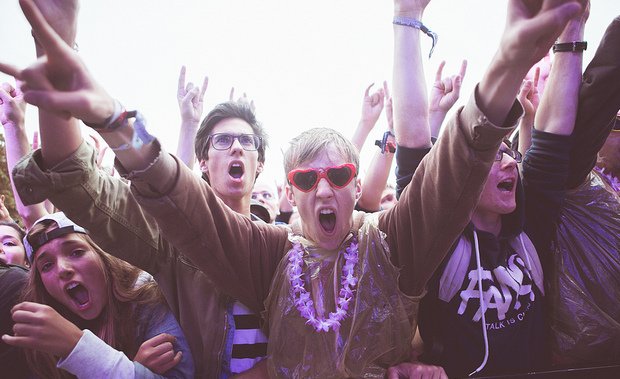 Image via flickr.com
Image via flickr.com
What if the term "music fan" meant much more than "listener"?
Until now, the recorded music model has supported only one active participant in the artist-fan relationship. As we move toward a more access-based industry, artists and labels will find that if they allow fans to move from passive (listening) to active (participating), then they will. If they don't, then they won't. This is why it's more important than ever for an artist to remain shoulder-to-shoulder with that most important segment of their fanbase: the superfan.
[More: 3 Surefire Ways to Turn Fans Into Superfans]
What I find fascinating is that as the industry has collapsed in on itself over the last 15 years, it has largely focused its efforts on trying to create a stronger middleman between the artist and his/her fans. In the course of doing so, the vast majority of artists and bands today, on a global scale, continue to give away key audience data to social networks, streaming services, and digital and physical retailers. Additional layers of management and labels widen the gap even more. Ironically, with more tools than at any time in history, the ones standing in the middle have all of the power when it could – and should – be the artists.
Despite the constant use of tools like Facebook, Twitter, Instagram, and YouTube – all of which are valuable tools for artists, no doubt – more artists are waking up to the importance of communicating directly with their fanbase. Or to put it another way, a lot of artists with amazing social followings woke up one day and realized that they had to pay Facebook to reach their fans for them.
I learned this lesson the hard way back in the Myspace days when my own band gave all its audience data to a middleman, only to watch it all dissolve. Not only were we beholden to the tools while we used them, but then we were powerless when the culture shifted to another network. Retaining control is even more important now than it was then, just one short digital generation ago.
So to the point of the title of this article: Direct-to-fan platforms are here to stay because the early adopters have proven that the model works. A well-executed direct-to-fan campaign brings in far more data, engagement, and money because it is simply a better experience than only buying or streaming music. When executed correctly, the platform becomes the thinnest skin between the artist and the fan. The platform is not in the way of the connection; instead, it serves as the connecting tissue. Best of all, the artist or label running the campaign keeps the most precious resource of all: the data.
Another important aspect that a direct-to-fan platform brings to the table is community – a group of now tens of millions of superfans who actually want this experience! In fact, they expect and, in some cases, demand it. At PledgeMusic, the existing community of superfans brings in around 40 percent of the preorders to our frontline projects. Even more, the artist owns that connection from the second that it's made. In fact, we built PledgeMusic around the idea that everyone wins when the artist wins.
It's important to note that one fan experience does not discount the other. Fans want the connective experience, and they want to pay more for it than they do for streaming alone. However, a fan who participates in a direct-to-fan campaign will still stream an album when it comes out.
The biggest question is this: why would an artist choose not to experience the upside of these platforms (more money, more data, and a better connection to the fans) over simply putting up presales and offering the music to stream? Why not do both?
All that I have seen and learned over the last six-plus years of building PledgeMusic (and all of the data) points towards this being what the highest-spending fans want. I believe that it is these fans who will force the change, even as most of the labels and, sadly, some artists cling to what was or what's failing to their own detriment. Letting the fans into the experience offers no downside whatsoever.
Do you agree that direct-to-fan platforms are here to stay? Sound off in the comments below!
Benji Rogers is an independent musician from London who has been making his own records since 1999. In 2009, Benji founded PledgeMusic, the leading international direct-to-fan platform offering artists a unique way to engage their fans in the music-making process while interacting with a global audience of music superfans, resulting in chart-topping albums worldwide. In 2013, Benji was recognized on Billboard’s 40 Under 40 Power Players list, and in 2014 at the MUSEXPO International Music Awards, he won Digital Executive of the Year.







